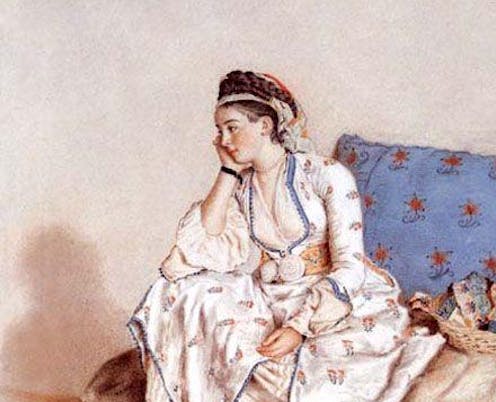
Can makeup really kill you? That’s the myth attached to Maria Gunning, the Countess of Coventry, an 18th-century socialite who reportedly died from her lead-based makeup in 1760, aged just 27.
In this episode of The Conversation Weekly podcast, we speak to a scientist who has recreated some centuries-old recipes for white lead makeup to test how dangerous these cosmetics were.
Lead poisoning can cause all types of health problems, including high blood pressure. It is a particular health hazard for women. It can cause early menopause and increase the risk of stillbirth and miscarriage.
And yet, lead used to be a common ingredient in skin-whitening makeup. The ancient Greeks and Romans put it in their cosmetics and white lead makeup, also known as ceruse, was fashionable between the 16th and 19th centuries in Europe.
Fiona McNeill is an expert in lead poisoning at McMaster University in Canada. But when she heard the story of the Countess of Coventry dying from her makeup, McNeill was sceptical.
“I’ve got this background in lead poisoning and I thought, this just can’t be true,” she tells us. While ingesting lead is toxic, McNeill was unconvinced that the lead in makeup would cross the skin in sufficient quantities to kill somebody.
McNeill and her colleagues decided to investigate. They found various centuries-old recipes for white lead makeup, recreated them in the lab, and then tested them on pig skin to find out.
And along the way, they’ve found what the makeup really looked like. “It’s always depicted in the movies and on TV as this white mask, this ridiculous-looking face. When we started making it in the lab, it doesn’t look like that at all,” she explains.
Read more: Dying for makeup: Lead cosmetics poisoned 18th-century European socialites in search of whiter skin
This episode of The Conversation Weekly was produced by Mend Mariwany and Gemma Ware, with sound design by Eloise Stevens. Our theme music is by Neeta Sarl. You can find us on Twitter @TC_Audio, on Instagram at theconversationdotcom or via email. You can also sign up to The Conversation’s free daily email here.
You can listen to The Conversation Weekly via any of the apps listed above, download it directly via our RSS feed, or find out how else to listen here.
Fiona E. McNeill receives funding from the Natural Sciences and Engineering Research Council of Canada.
This article was originally published on The Conversation. Read the original article.







